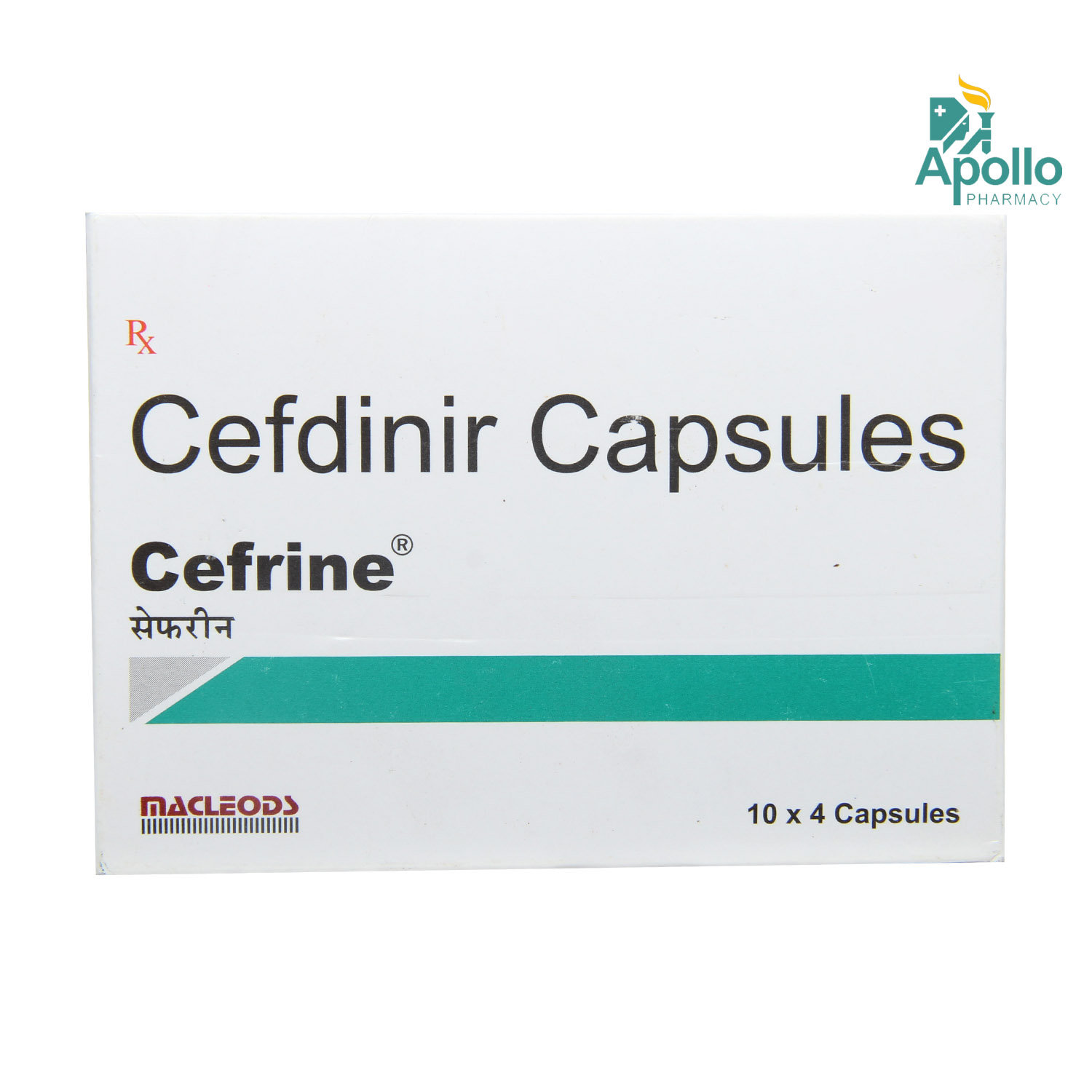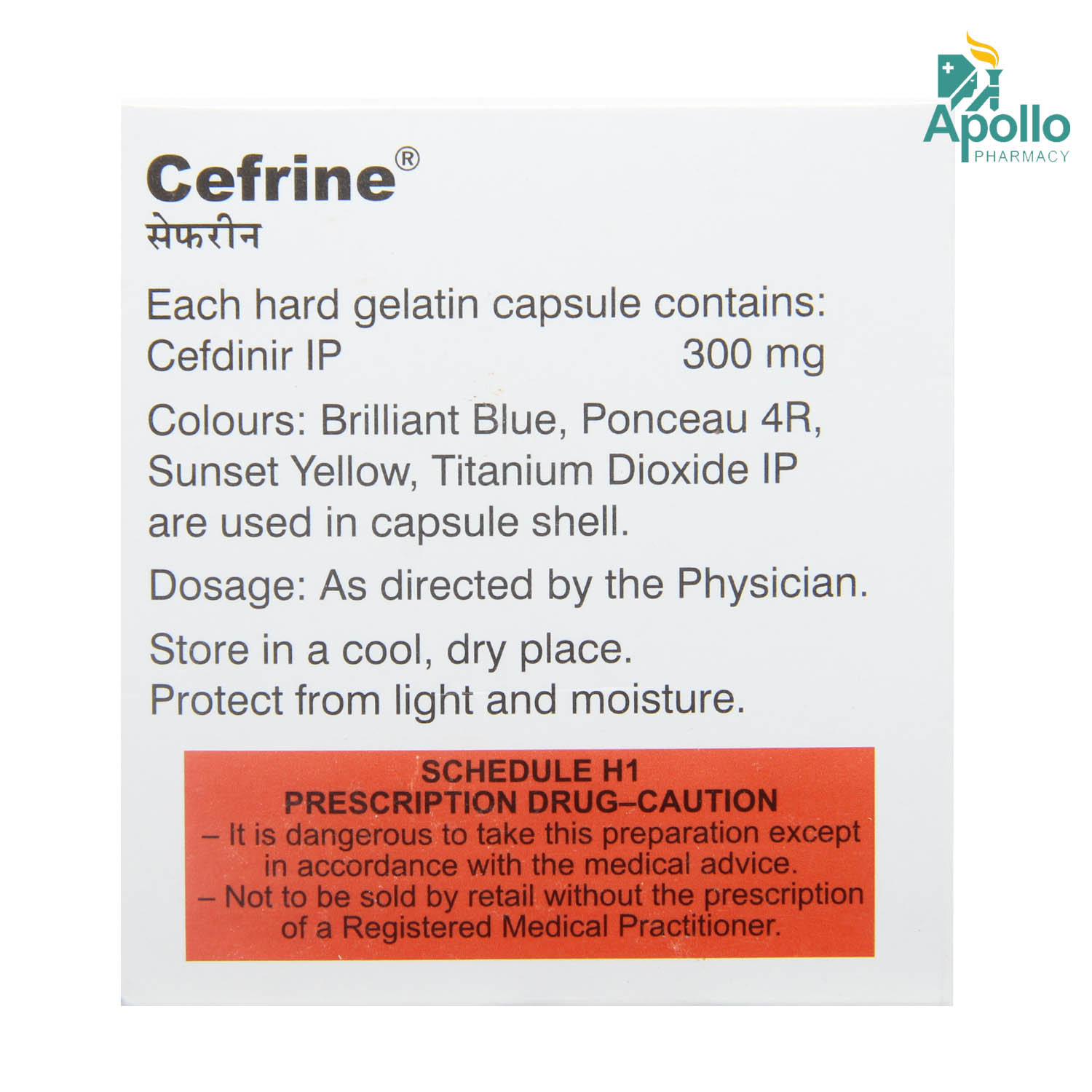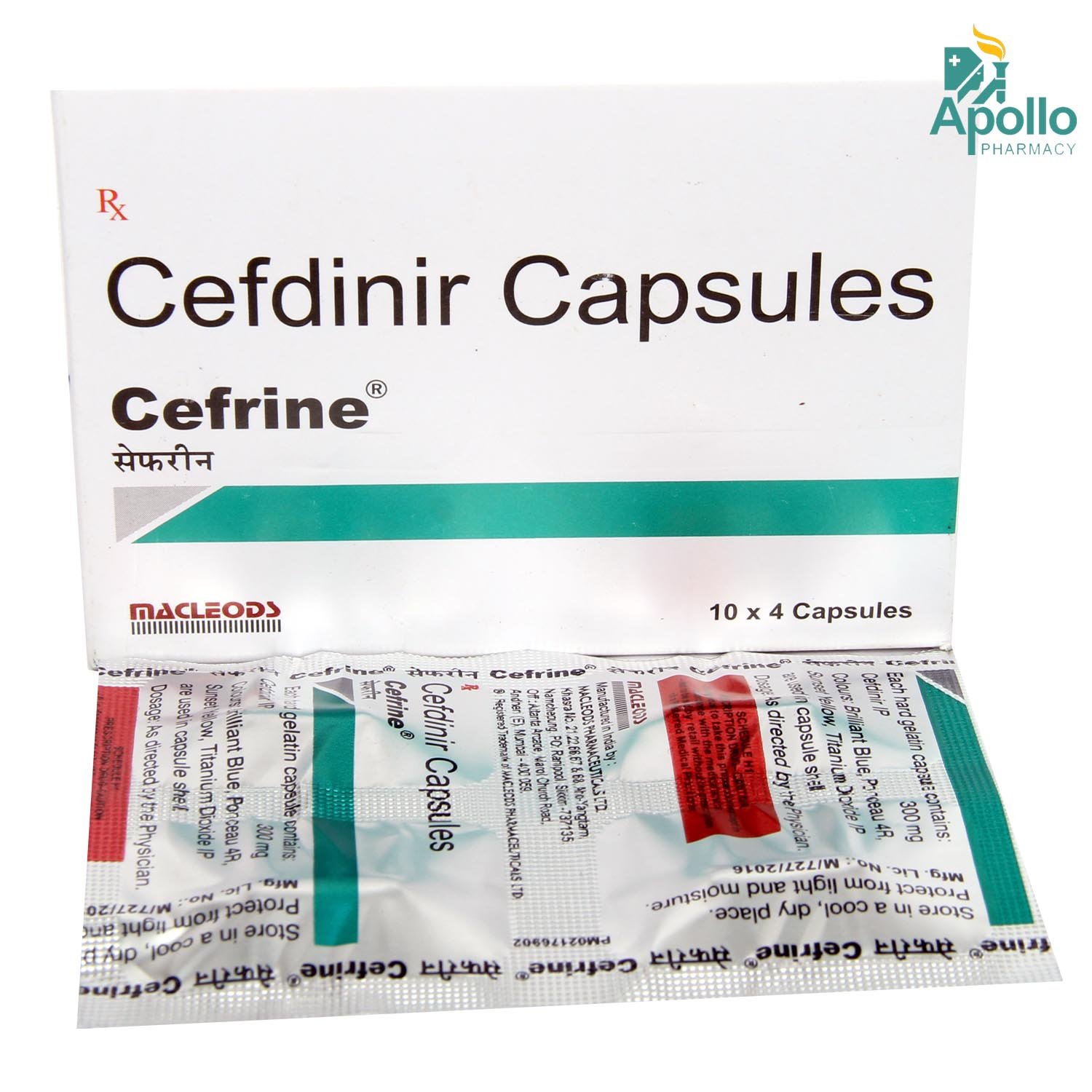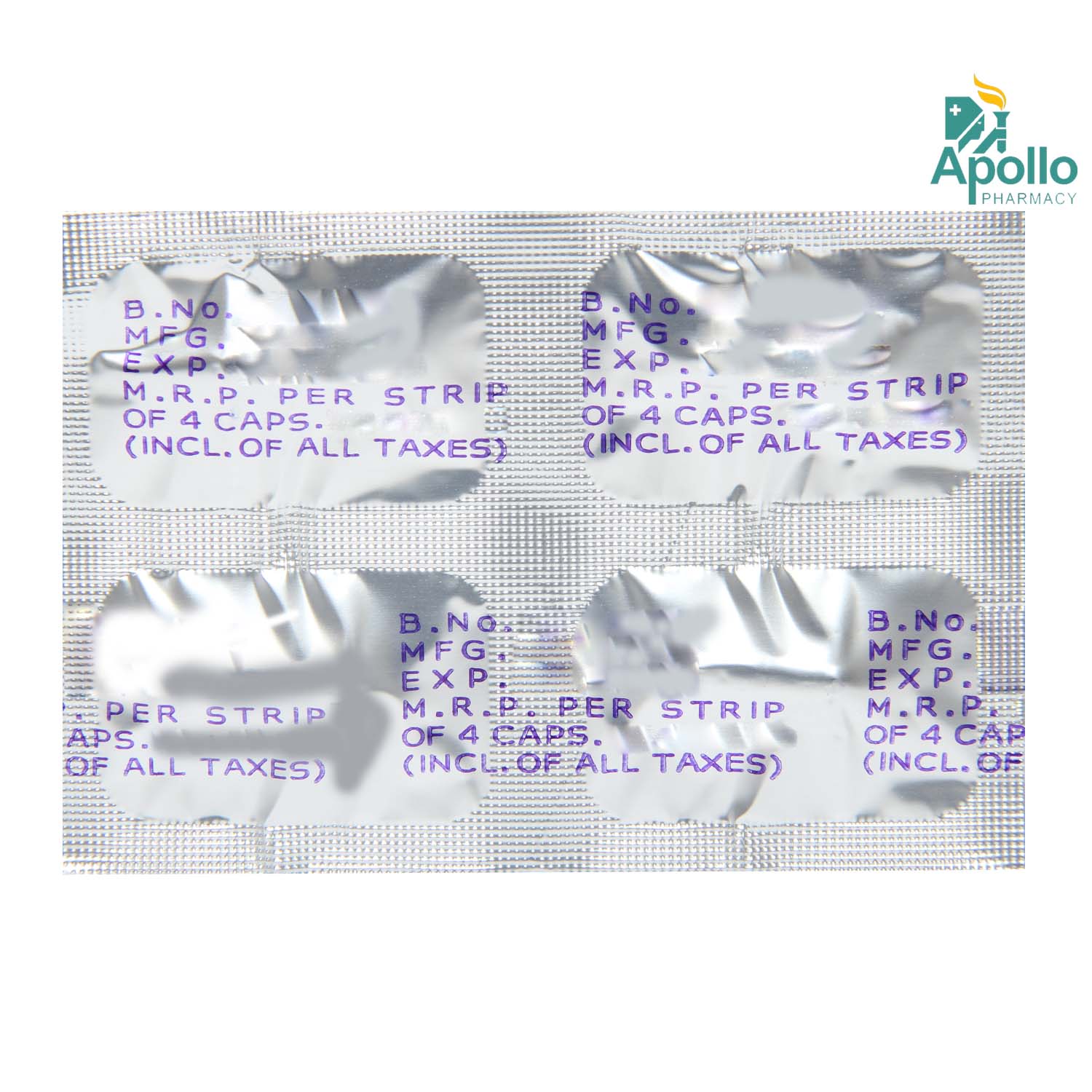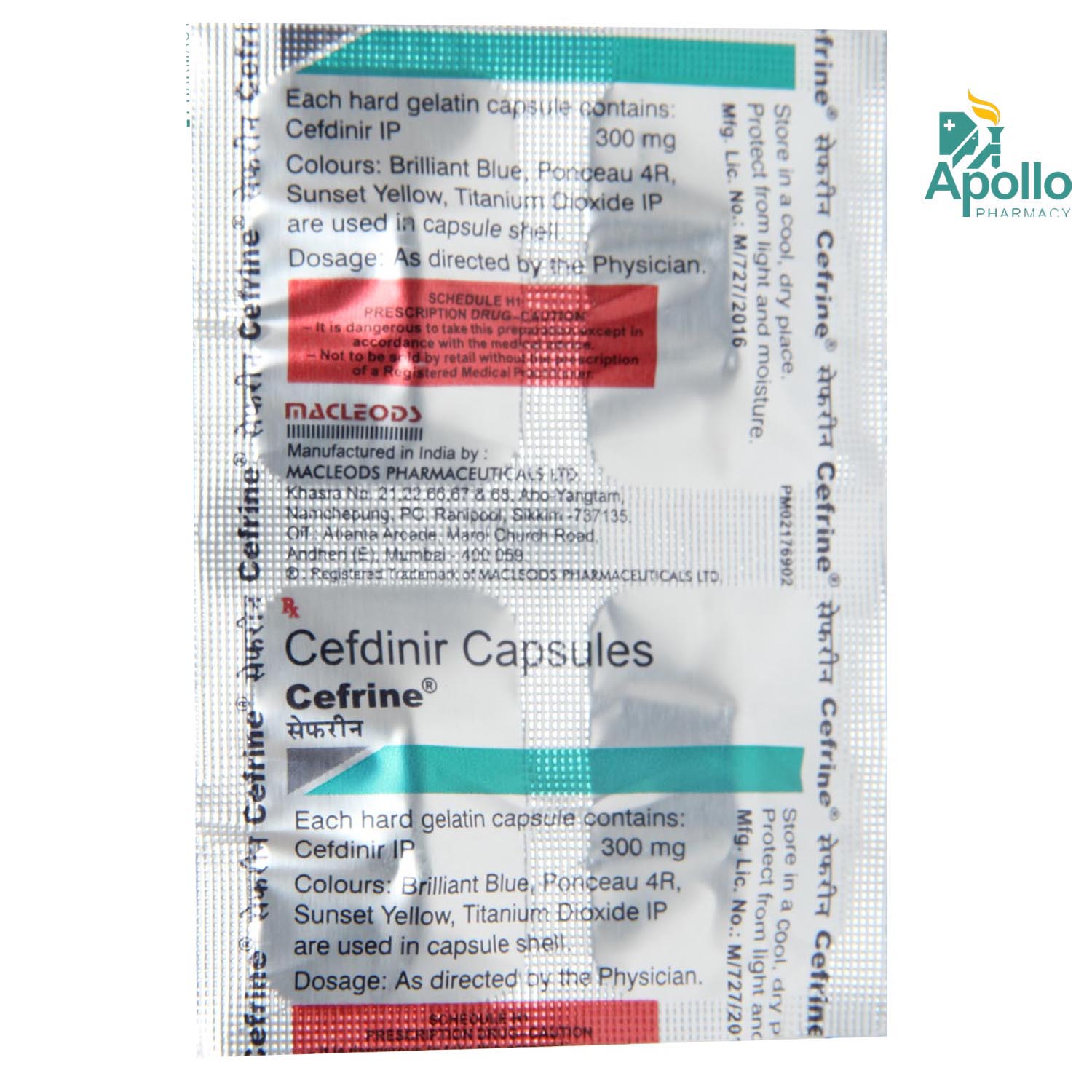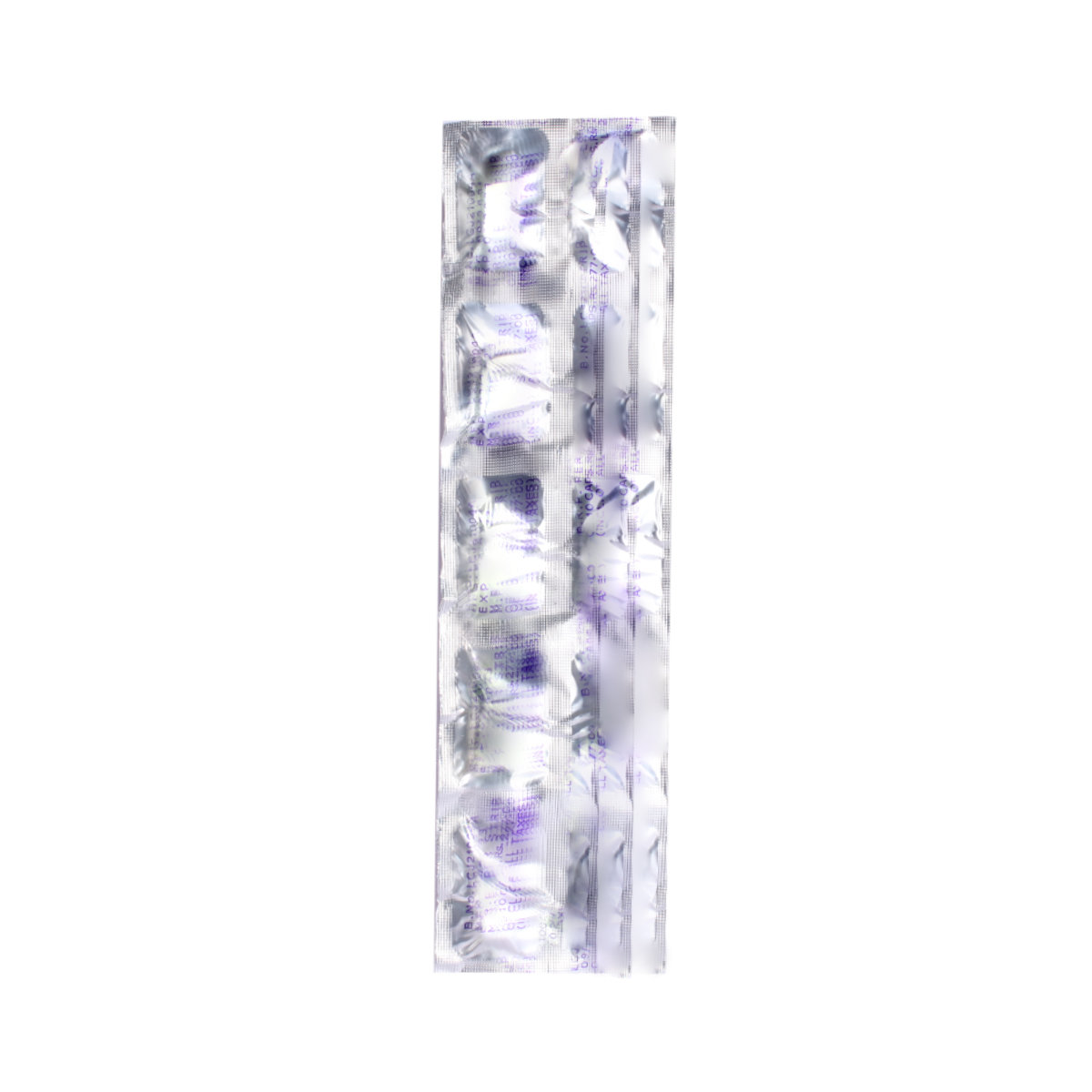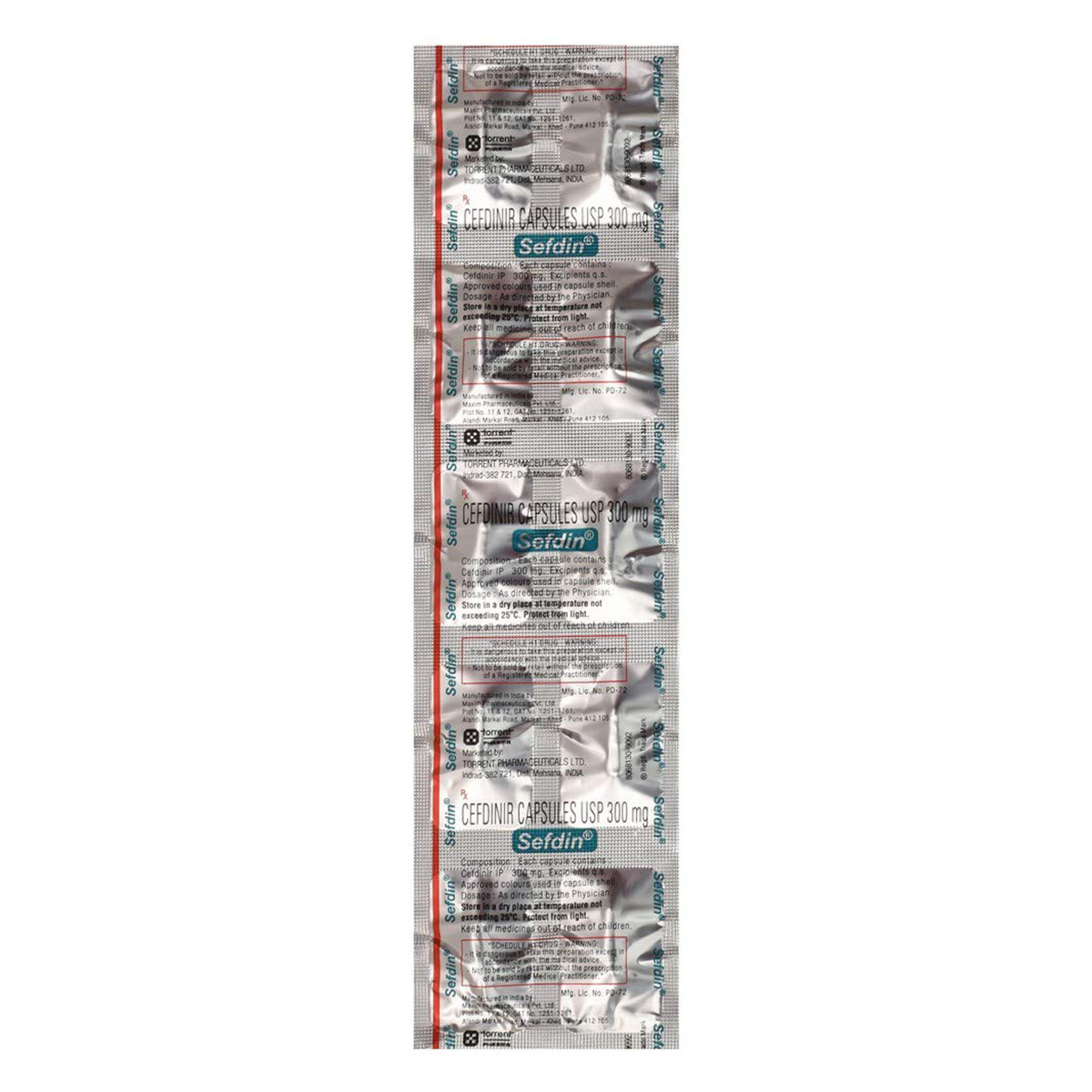Cefrine Capsule 4's
MRP ₹137.5
(Inclusive of all Taxes)
₹20.6 Cashback (15%)
Selected Pack Size:4
4 ₹123.8
(₹30.95 per unit)
Out of stock
10 ₹309.6
(₹30.96 per unit)
Out of stock
Provide Delivery Location
Online payment accepted
 Prescription drug
Prescription drugWhats That
Composition :
Manufacturer/Marketer :
Consume Type :
Expires on or after :
Return Policy :
About Cefrine Capsule
Cefrine Capsule belongs to a class of medication called 'antibiotics' used to treat several bacterial infections of the urinary tract, bones and joints, heart, lungs, brain, chest, ears, skin or soft tissues. The bacterial infection is a condition in which harmful bacteria grows in the body and cause infection. It can infect any part of the body and multiple very quickly. Cefrine Capsule does not work against infections caused by a virus such as flu or a common cold.
Cefrine Capsule contains 'Cefdinir' a cephalosporin antibiotic that works by interfering with the formation of the bacterial cell wall (a protective covering) necessary for their survival. Thereby damages the bacterial cell wall and kills bacteria.
Take Cefrine Capsule as prescribed by your doctor. You are advised to take Cefrine Capsule for as long as your doctor has prescribed it for you based on your medical condition. In some cases, you may experience diarrhoea, nausea, stomach pain, vomiting, rash, headache or vaginal itching or discharge. Most of these side effects of Cefrine Capsule do not require medical attention and gradually resolve over time. However, if the side effects persist or worsen, please consult your doctor.
If you are allergic to Cefrine Capsule, cephalosporin antibiotics or any other medicines, please tell your doctor. If you are pregnant or breastfeeding, inform your doctor before taking Cefrine Capsule. Cefrine Capsule is not recommended for babies below 6 months of age as the safety and effectiveness were not established. Drive only if you are alert as Cefrine Capsule may cause dizziness. You are advised to maintain a time gap of a minimum of 2 hours between taking Cefrine Capsule and antacids containing aluminium, magnesium, iron supplements and multivitamins containing iron. These may reduce the absorption of Cefrine Capsule by the body.
Uses of Cefrine Capsule
Directions for Use
Key Benefits
Cefrine Capsule contains Cefdinir a cephalosporin antibiotic used in the treatment of several bacterial infections. Cefdinir is a broad-spectrum antibiotic that acts against both aerobic (grow in the presence of oxygen) and anaerobic (grow in the absence of oxygen) gram-negative and gram-positive bacteria. It interferes with the formation of the bacterial cell wall (a protective covering) that is necessary for their survival. Thereby damages the bacterial cell wall and kills bacteria.
Storage
- Inform Your Doctor: Notify your doctor immediately about your diarrhoea symptoms. This allows them to adjust your medication or provide guidance on managing side effects.
- Stay Hydrated: Drink plenty of fluids to replace lost water and electrolytes. Choose water, clear broth, and electrolyte-rich drinks. Avoid carbonated or caffeinated beverages to effectively rehydrate your body.
- Follow a Bland Diet: Eat easy-to-digest foods to help firm up your stool and settle your stomach. Try incorporating bananas, rice, applesauce, toast, plain crackers, and boiled vegetables into your diet.
- Avoid Trigger Foods: Steer clear of foods that can worsen diarrhoea, such as spicy, fatty, or greasy foods, high-fibre foods, and dairy products (especially if you're lactose intolerant).
- Practice Good Hygiene: Maintain good hygiene to prevent the spread of infection. To stay healthy, wash your hands frequently, clean and disinfect surfaces regularly, and avoid exchanging personal belongings with others.
- Take Anti-Diarrheal Medications: If your doctor advises, anti-diarrheal medications such as loperamide might help manage diarrhoea symptoms. Always follow your doctor's directions.
- Keep track of your diarrhoea symptoms. If they don't get better or worse or are accompanied by severe stomach pain, blood, or dehydration signs (like extreme thirst or dark urine), seek medical help.
- Drink water or other clear fluids.
- To prevent worsening of pain, limit intake of tea, coffee, or alcohol.
- Include bland foods like rice, toast, crackers, and rice in your diet.
- Avoid lying down immediately after eating as it may cause indigestion or heartburn.
- Avoid acidic and spicy food as it may cause indigestion.
- Take medications with food (if recommended): It can help prevent stomach distress and indigestion.
- Eat smaller, more frequent meals: Divide daily food intake into smaller, more frequent meals to ease digestion.
- Avoid trigger foods: Identify and avoid foods that trigger indigestion, such as spicy, fatty, or acidic foods.
- Stay upright after eating: Sit or stand upright for at least 1-2 hours after eating to prevent stomach acid from flowing into the oesophagus.
- Avoid carbonated drinks: Avoid drinking carbonated beverages, such as soda or beer, which can worsen indigestion.
- Manage stress: To alleviate indigestion, engage in stress-reducing activities like deep breathing exercises or meditation.
- Consult a doctor if needed: If indigestion worsens or persists, consult a healthcare professional to adjust the medication regimen or explore alternative treatments.
- Tell your doctor about your GAS symptoms. They may change your medication regimen or prescribe additional drugs to help you manage them.
- To manage GAS symptoms, eat a balanced diet of fibre, vegetables, and fruits.
- Drink enough water throughout the day to avoid constipation and treat GAS symptoms.
- Regular exercise like yoga and walking may help stimulate digestion and alleviate GAS symptoms.
- Take probiotics only if your doctor advises, as they may help alleviate GAS symptoms by promoting gut health.
- Take medication for GAS symptoms only if your doctor advises, as certain medications can interact with your existing prescriptions or worsen symptoms.
- If symptoms persist, worsen, or are accompanied by severe abdominal pain, vomiting, or bleeding, seek immediate medical attention.
- Your doctor may adjust the dose of your medication, discontinue, or switch to alternative medicines to manage your symptoms.
- Drink plenty of water and caffeine-free drinks.
- Eat more fibre by consuming fruits, vegetables, and whole grains.
- Avoid processed, spicy, or fatty foods.
- Try not to skip meals, delay eating, or eat too quickly.
- Regular exercise can help improve digestion and promote better stool movement.
Drug Warnings
If you are allergic to Cefrine Capsule, cephalosporin antibiotics or any other medicines, please tell your doctor. If you have kidney problems or inflammation of the large intestine, inform your doctor before taking Cefrine Capsule. If you are pregnant or breastfeeding, consult a doctor before taking Cefrine Capsule. Cefrine Capsule is not recommended for babies below 6 months of age as the safety and effectiveness were not established. Drive only if you are alert as Cefrine Capsule may cause dizziness. You are recommended to complete the full course of Cefrine Capsule as prescribed by your doctor for effective results. Cefrine Capsule may interact with specific tests such as glucose (sugar) in urine and coomb’s test, giving false-positive results. Therefore, inform your doctor that you are taking Cefrine Capsule before undergoing any tests. You are advised to maintain a time gap of a minimum of 2 hours between taking Cefrine Capsule and antacids containing aluminium, magnesium, iron supplements and multivitamins containing iron. These may reduce the absorption of Cefrine Capsule by the body.
Drug-Drug Interactions
Drug-Drug Interactions
Login/Sign Up
Taking Cefrine Capsule with BCG vaccine may reduce the effects of BCG vaccine.
How to manage the interaction:
Taking Cefrine Capsule with BCG vaccine is not recommended, but it can be taken if prescribed by a doctor. However, if you experience any unusual symptoms contact your doctor immediately. Do not discontinue any medications without consulting a doctor.
Taking Cefrine Capsule with lepirudin may reduce the beneficial effects of therapy.
How to manage the interaction:
Although taking Cefrine Capsule and Lepirudin together can evidently cause an interaction, it can be taken if your doctor has suggested it. Do not stop using any medications without first talking to your doctor.
Taking Cefrine Capsule with argatroban may lead to increase in the effects of Argatroban.
How to manage the interaction:
Although taking Cefrine Capsule and Argatroban together can evidently cause an interaction, but it can be taken if prescribed by a doctor. In case you experience any side effects like chest tightness, shortness of breath, swelling of legs, or palpitations, consult a doctor. Do not stop using any medications without first talking to your doctor.
Taking Cefrine Capsule with Cholera vaccine can reduce the activity of the Cholera vaccine.
How to manage the interaction:
Taking Cefrine Capsule with Cholera, live attenuated together can possibly result in an interaction, but it can be taken if your doctor has advised it. However, if you experience unusual symptoms contact your doctor immediately. Do not stop using any medications without first talking to your doctor.
Taking Cefrine Capsule with heparin may enhance the effects of heparin by anticoagulation(preventing blood from clotting).
How to manage the interaction:
Although taking Cefrine Capsule and Heparin can cause an interaction, it can be taken if a doctor has suggested it. In case you experience aby unusual effects like lightheadedness, dizziness, unusual bruising, bleeding tendencies, blood in stools or urine, consult a doctor. Do not stop using any medications without a doctor's advice.
Taking Cefrine Capsule with bivalirudin may increase the effects of bivalirudin.
How to manage the interaction:
Although taking Cefrine Capsule and Argatroban together can evidently cause an interaction, but it can be taken if prescribed by a doctor. In case you experience any side effects like chest tightness, shortness of breath, swelling of legs, or palpitations, consult a doctor. Do not stop using any medications without first talking to your doctor.
Taking Cefrine Capsule with dalteparin together may decrease the therapeutic effects of dalteparin.
How to manage the interaction:
Although taking Cefrine Capsule and dalteparin can evidently cause an interaction, it can be taken if your doctor has suggested it. In case you experience aby unusual effects like lightheadedness, dizziness, unusual bruising, bleeding tendencies, blood in stools or urine, consult a doctor. Do not stop using any medications without a doctor's advice.
Taking fondaparinux and Cefrine Capsule may increase the effects of fondaparinux.
How to manage the interaction:
Although taking Cefrine Capsule and Fondaparinux can evidently cause an interaction, it can be taken if your doctor has suggested it. In case you experience aby unusual effects like lightheadedness, dizziness, unusual bruising, bleeding tendencies, blood in stools or urine, consult a doctor. Do not stop using any medications without a doctor's advice.
Drug-Food Interactions
Drug-Food Interactions
Login/Sign Up
Avocado, Beetroot, Cereals, Cheese, Chicken, Black Beans, Eggs, Clams, Chickpea, Whole Grains, Shellfish, Spinach, Salmon, Red Meat, Oysters, Potatoes, Kidney Beans, Mackerel, Milk, Kale, Tuna, Yogurt, Liver, Low-Fat Milk, Trout, Fortified Breakfast Cereal, Fish, Beef
How to manage the interaction:
Cefrine Capsule and multivitamin with minerals should not be taken orally at the same time. Iron-containing products decreases the effects of Cefrine Capsule. Although there is an interaction between Cefrine Capsule and multivitamins, it can be taken if advised by a doctor. It should be taken two hours either before or after the dosage of the multivitamin with minerals.
Diet & Lifestyle Advise
- Take probiotics after completing the full course of Cefrine Capsule to restore some healthy bacteria in the intestines that may have been killed. Taking probiotics after antibiotic treatment can reduce the risk of antibiotic-associated diarrhea.
- Certain fermented foods like cheese, yogurt, kombucha, sauerkraut, and kimchi can help to restore the good bacteria of the intestine.
- Include fiber-rich foods, as they can be easily digested by your gut bacteria, which helps stimulate their growth. Thus, fiber-rich foods may help restore healthy gut bacteria after a course of antibiotics. Whole grains such as brown rice and whole-grain bread should be included in your diet.
- Make sure you drink plenty of water or other fluids every day while you are taking Cefrine Capsule.
- Avoid alcohol consumption as it may increase adverse effects.
Side Effects of Cefrine Capsule
- Diarrhoea
- Nausea
- Stomach pain
- Vomiting
- Rash
- Headache
- Vaginal itching or discharge
Habit Forming
Therapeutic Class
All Substitutes & Brand Comparisons
RX
Out of StockNot for online saleALDINIR 300MG CAPSULE
Alembic Pharmaceuticals Ltd
₹19.7
(₹4.43 per unit)
85% CHEAPERRX
Out of StockNot for online saleCefdipar 300mg Capsule
Parenteral Drugs India Ltd
₹81.25
(₹18.28 per unit)
40% CHEAPERRX
Out of StockNot for online saleADCEF 300MG CAPSULE
Torrent Pharmaceuticals Ltd
₹205
(₹18.45 per unit)
40% CHEAPER
Author Details
We provide you with authentic, trustworthy and relevant information
Drug-Diseases Interactions
Drug-Diseases Interactions
Login/Sign Up
FAQs
Drug-Drug Interactions Checker List
- PROBENECID
Special Advise
If you are about to undergo any blood or urine tests, inform your doctor that you are taking Cefrine Capsule as it may interfere with urine test (for sugar) and Coomb’s test (blood test).
Disease/Condition Glossary
Bacterial infection: It is a condition in which harmful bacteria grows in the body and cause infection. It can target any part of the body and multiply very quickly. Bacteria come in three basic shapes, namely spherical, rod or spiral-shaped. Bacteria may be gram-positive (have thick cell wall) or gram-negative (do not have cell wall). Appropriate tests are done to identify bacterial strains, and based on the results, proper medication is prescribed. Some common symptoms of bacterial infection include cough, fever and tiredness.

Have a query?
Alcohol
Safe if prescribed
Interaction of Cefrine Capsule with alcohol is unknown. Please consult a doctor before consuming alcohol while using Cefrine Capsule.
Pregnancy
Consult your doctor
Cefrine Capsule is a category B pregnancy drug and is given to pregnant women only if the doctor thinks benefits outweigh risks. Please consult a doctor if you are pregnant or planning for pregnancy.
Breast Feeding
Consult your doctor
It is unknown whether Cefrine Capsule is excreted in human milk. Cefrine Capsule is given to breastfeeding mothers if the doctor thinks benefits are greater than risks. Please consult a doctor if you are breastfeeding.
Driving
Safe if prescribed
Cefrine Capsule may cause dizziness in some people. Therefore, avoid driving if you feel dizzy after taking Cefrine Capsule.
Liver
Consult your doctor
If you have any concerns regarding the use of Cefrine Capsule in patients with liver problems, please consult a doctor.
Kidney
Consult your doctor
Take Cefrine Capsule with caution, especially if you have a history of Kidney diseases/conditions. The dose may be adjusted by your doctor as required.
Children
Safe if prescribed
Cefrine Capsule is not recommended for babies below 6 months of age as the safety and effectiveness were not established.

